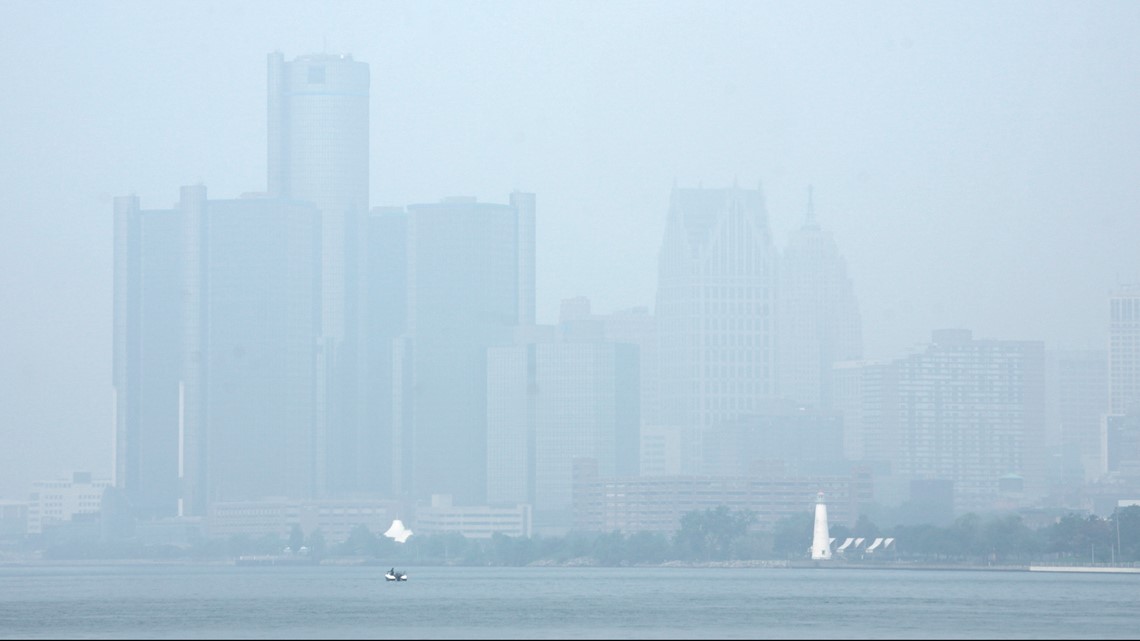WASHINGTON — Smoke from wildfires in Canada continue to be a problem in the United States, most recently lowering curtains of haze across the Midwest pushing into southern Illinois, Indiana and Ohio, and moving into parts of West Virginia.
Minnesota issued a record 23rd air quality alert for the year through late Wednesday night, as smoky skies obscured the skylines of Minneapolis and St. Paul. Michigan and Wisconsin were among other states issuing air quality alerts, and cities including Louisville also advised people to limit prolonged or intense outdoor activity.
Where are the Canadian wildfires?
The fires are burning in Canada's eastern provinces. While wildfires are common in Canada's west, this year Nova Scotia, Quebec and parts of Ontario have been dealing with out of control blazes.
Canadian officials say it is the nation’s worst wildfire season ever and they expect air quality to remain a concern through the summer, as long as the fires continue.
Unfortunately, officials said Wednesday that recent heavy rains failed to fall in areas of Quebec where the fires are most active.
There are 490 fires burning nationally, with 255 of them considered to be out of control. Quebec’s forest fire prevention agency is reporting 110 active fires.
Canada already surpassed the record for area burned. The Canadian Interagency Forest Fire Centre reported this week that 76,129 square kilometers (29,393 square miles) of forest and other land has burned across Canada since Jan. 1. That exceeds the previous record set in 1989 of 75,596 square kilometers (29,187 square miles), according to the National Forestry Database.
How long is the smoke going to last?
The National Weather Service said Tuesday similar conditions were expected the next couple of days across a wide swath of the Midwest.
Environment and Climate Change Canada Meteorologist Steven Flisfeder said smoke will migrate across Quebec and Ontario over the next few days, and that air quality will deteriorate as a result.
“As long as the fires are burning and the smoke is in the atmosphere it is going to be a concern not just for Canadians but Americans as well,” Flisfeder said.
Flisfeder said the smoky, hazy skies will persist unless rainfall provides sufficient help to firefighters in controlling the blazes. “It’s important to note that the highest amounts of rain were not received in those areas where most active forest fires are,” Flisfeder said.
The Detroit area woke up Wednesday to some of the worst air quality in the United States as smoke from Canada’s wildfires settled over most of the Great Lakes region and unhealthy haze spread southward, as far as Missouri and Kentucky.


What started the fires?
At this point, it's unclear what exactly caused Canada's ongoing wildfires.
When a wildfire starts, an investigation into the cause can't begin until firefighters have contained the blaze or it burns out. Canadian officials have asked other countries for additional help fighting the fires. Because of the sheer number of fires burning at once, it's difficult to spare the resources needed to identify the cause of any particular one.
But there are traditionally a few causes for wildfires during summer months, when vegetation dries up and becomes tinder. The two usual culprits are weather and humans.
In the case of weather, lightning strikes can spark a fire in a remote area that makes it difficult to detect until the blaze becomes too big to easily manage. This is a frequent danger from summer storms.
But by far the most common cause of wildfires is human activity. According to the U.S. National Parks Service, humans cause about 85% of all wildfires in the country. While that may be true, there are a lot of different ways for humans to cause a fire.
Common causes include campfires, burning of debris near the wilderness, vehicle use and malfunctions, discarded cigarettes and intentional arson.
At least some of the current wildfires are likely connected, with sparks from one fire likely being carried on the wind to start another nearby.

